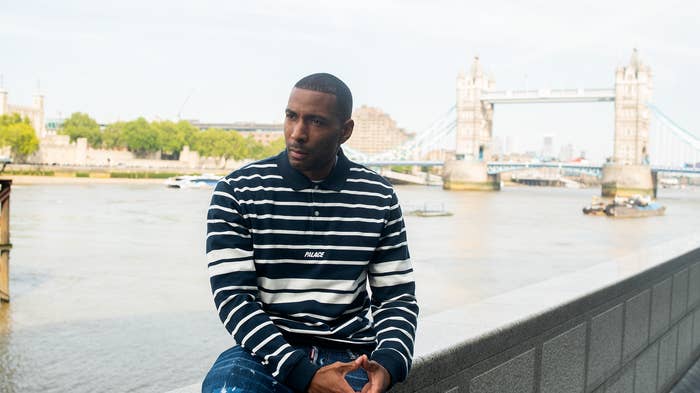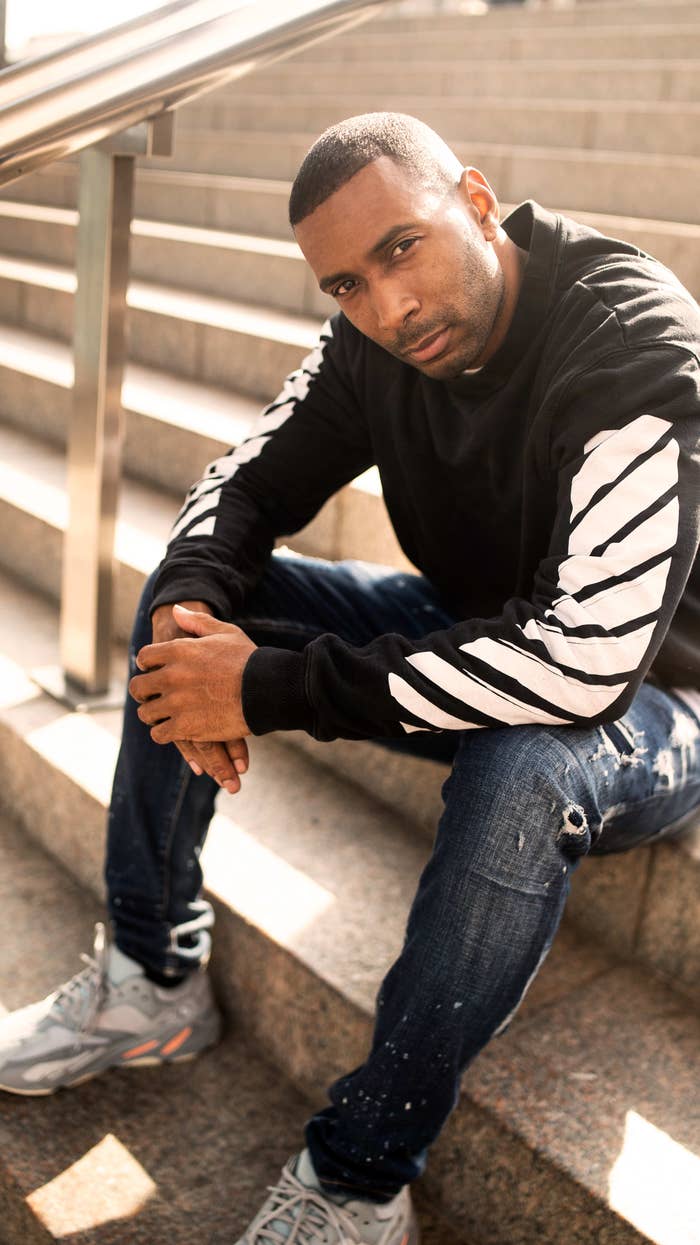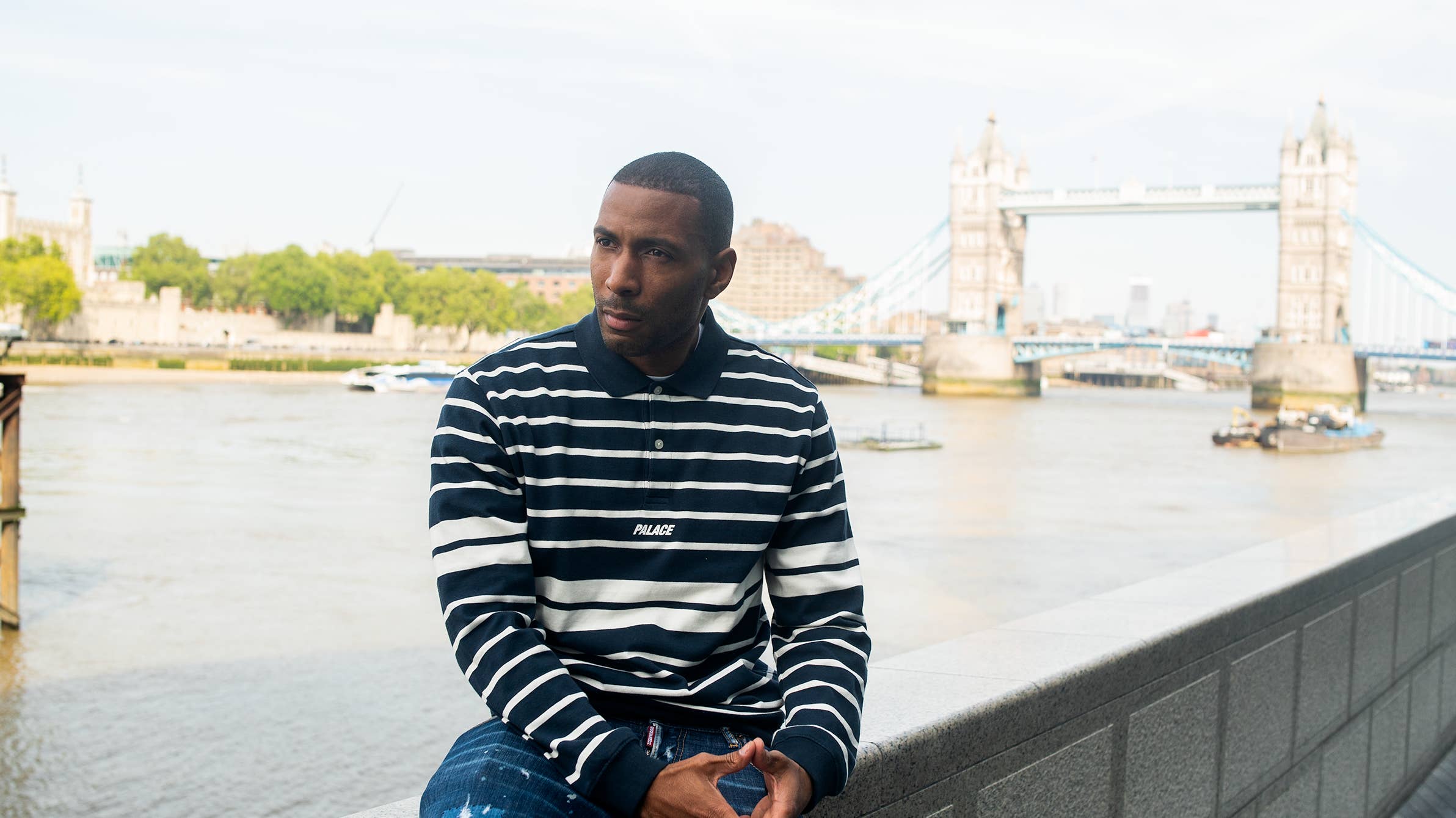
The British music scene is much more than the MCs, selectas, and producers that have kept it chugging along for decades. Before major labels, media platforms and brands took a commercial interest, there were those who sought to amplify and champion the voices that couldn’t get a look-in anywhere else.
One of those early innovators and pacesetters was Duane Jones—aka ‘Vis’—who has gone from underground broadcaster to mainstream radio, to co-founding and running his own production company Renowned. Anyone with a vested interest in the UK scene has heard Duane's voice—be it through The Ace & Vis Show on BBC 1Xtra or online talk show Not For The Radio—and after nearly twenty years in the industry documenting, broadcasting and reporting from the frontlines, Jones sought to take his creative vision to new heights when he co-founded the Renowned Group in 2013, with rapper Wretch 32 and A&R exec Zeon Richards.
Starting originally as a music talent company, Renowned Films was born a few years later with Tim Withers and Max Welch on board as directors. Renowned has since produced an array of shows, from investigative documentaries such as NYPD: Biggest Gang In New York? and Hate and Pride of Orlando to Channel 4’s Peng Life and Rated Awards. For all that we see on the consumer end of music and TV within this scene of ours, it’s people like Duane Jones who have given the best and brightest talent a platform and a place to call home.
Complex caught up with the media exec to find out what’s coming next.

COMPLEX: Things have come full circle for you since The Illout Show with Ace, and the interviews you were doing during grime’s early days. How does it all feel?
Duane Jones: It feels great, to be honest. When I first started The Illout Show, I didn’t imagine it would lead to working at the BBC, and then now with my own production company. I don’t always take a step back to look at all the things I’ve done, partly because I’m always busy working on the next thing and the thing after that.
Why do you think that is?
I don’t think anyone ever really has much time to dwell on past accomplishments because the rest of the world has already moved onto the next thing.
Are you and Ace still good friends today?
Ace and I aren’t friends—we’re brothers.
Not For The Radio, that’s something which is pretty representative of not only your career but the independence of the scene.
Yeah, Not For The Radio is a platform that was built to give artists to the license to say whatever they want to, no-holds-barred. When it comes to broadcasting, so much is censored and for a lot of the people that come on the show, it’s a chance for them to talk openly and honestly. They don’t usually get the chance to when they’re doing interviews with bigger platforms, but NFTR is the place for that.
There aren’t many platforms like that these days, which is why NFTR is so valuable. I sometimes see kids watching it on the bus, which proves its value.
When me, Posty and Chams started it, that was the aim: to cut through all the noise and facilitate the stories that you don’t usually hear as a fan.
The Wiley interview—the first one—it’s still one I go back to because it was so revealing and Wiley’s hard to pin down.
It was his idea to come on the show because he had a lot to say at that point in time. And that’s the kind of platform we always wanted to be.
Could Not For The Radio grow into something bigger?
At the moment, the concept works—which is something to have pride in. It’s hard to maintain an audience with longform content, particularly if it’s niche, but Not For The Radio is doing really well and maybe there’s a chance to do something bigger in the future. It’s more of passion project at the moment, so we’re happy with the format.
View this video on YouTube
Not many people know about Renowned and what you do there—what exactly is it?
The initial Renowned brand was launched by myself, Wretch [32] and Zeon [Richards] as a 360 creative space for managing artists such as Knox Brown, Jacob Banks and of course, Wretch. We started branching out into different divisions, one being Renowned Films. We’ve produced shows and documentaries such as the Rated Awards, Spotify’s live show Who We Be, Peng Life, Generation Grime and Top Dad with Ashley Walters, as well as investigative pieces on police brutality, like NYPD: Biggest Gang In New York?, and content for new football platform Otro, where I got to work with footballing legends like Beckham, Neymar and Messi.
And if I’m right in asking, you’re working with BET on a project?
Yeah, we’ve recently had a 10-part series commissioned for BET called Copwatch America, which will explore in further depth the copwatch movement across the US. It’s an exciting time for the company as we’ve just been named one of the top 5 fastest-growing independent production companies in the UK. As this is our second US series commission, we definitely have our sights set on continuing to expand in the US market.
Do you feel you could’ve done all of this earlier in your career?
Probably, but all of the work I was doing before led me here. Not For The Radio wouldn’t have been able to exist if there wasn’t that trust already established—it’s like a snowball effect.
It seems like starting your own company was a natural step, especially after working at the BBC.
Yeah, it was. I’ve always liked creating something of my own, and it’s harder to do that when you’re part of a bigger organisation. I think that’s what makes the scene what it is; a lot of the people in and around it have something for themselves that they can call their own. Together with my co-founders Tim and Max, we brought together a small, hard-working core team who have helped bring our vision to life.
“The adversity you face growing up in hard circumstances is a catalyst for creativity; it’s an escape from the often dark realities that surround you, and it becomes a beacon of hope.”
Do you reckon film is something that could be on the horizon?
It’s not something I’d rule out, but only if it feels right. It’s a different world to TV and broadcasting but if everything is in the right place at the right time, then, why not?
What are your thoughts on what Rapman has done with Shiro’s Story, having now been signed to Roc Nation by Jay-Z to write and direct movies and sign artists?
What he’s done is incredible. He’s the classic example of why you should never give up and always believe in yourself. He had a vision with Shiro’s Story, and an unfaltering belief in that vision. And that belief and determination turned Shiro’s Story into this epic story that had millions of people tuning in, and we’re talking views that rival terrestrial television. It doesn’t surprise me that the series caught Jay-Z’s attention; it’s a sick concept, and watching its execution, you know Rapman would be a great asset to your team. We’ve seen a lot more artists, especially independent ones, creating film-worthy visuals and thought-provoking campaigns as part of their projects, and I think it’s great that they’re now in a position to showcase all aspects of their creativity.
Has it gotten easier to do what you do or are you just more accustomed to navigating these environments?
Definitely the latter. You’re going to have bad days and difficult projects because there are so many stakeholders involved with a TV project and with anything creative. What you can’t do is take anything personally because you can lose sight of the end goal.
There seems to be a rise in creatives coming out of London, especially from not-so-privileged backgrounds, and they’re really making their mark. What pointers would you give to people just stepping into the game?
The adversity you face growing up in hard circumstances is a catalyst for creativity; it’s an escape from the often dark realities that surround you, and it becomes a beacon of hope. And from that hardship really beautiful things can come—think of all those classic albums that have come from artists growing up in the struggle. For those just stepping in, I would say create and take the opportunities that represent yourself; you need to hone your craft, so it’s good to experience your passion from as many different angles as possible when you’re starting out to know which way you want to go. You want to create content, but is your specialism directing, producing or shooting? You need to be on-set to really know. It’s a very competitive market and your experience counts for a lot.
More often than not, it will be the person with the long list of credits that will get the job over an exciting, yet inexperienced talent. That does mean some jobs might be unpaid just to get your foot in the door; an unpaid runner job on a music video, for example. Of course you need to know your value, and it’s great that the next generation are very in-tune with this, but your value increases with your knowledge and experience so make sure you’re everywhere and knocking on all doors and putting in the work. There’s also social media as a platform to showcase your work now, so getting the right people to see it is so much easier than it once was.


